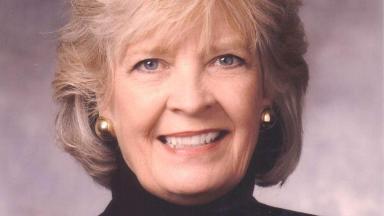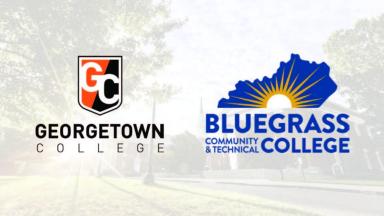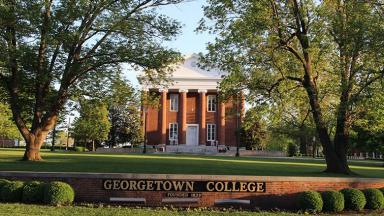Science Honors Program Paves the Way for Medical School Success
Submitted on February 18, 2021
Austin Bambach ’19 always dreamed of medical school, so when he was presented with the chance to take part in Georgetown College’s Science Honors Program, he saw it as the perfect opportunity to realize that dream. His time in the program allowed him to participate in research projects the caliber and scope of which are rarely available to undergraduate students.
These projects, along with the mentorship and training received in the program, have set Austin up for success in medical school and beyond.
Currently attending Edward Via College of Osteopathic Medicine at Auburn University, Austin saw the Science Honors Program as the perfect way to experience something few students do before entering medical school.
“I wanted to get that lab experience, which the program provided for me,” he said. During his time at Georgetown College, Austin participated in a study looking at inhibitors for an enzyme that causes hypertension. “I think it’s necessary for physicians to understand how these things are developed, all the steps they have to go through. It really helped me stay up to date on what was happening in the field, helped me understand all the mechanisms behind everything a little bit better, and will help me be a better physician overall.”
Interacting with leaders in the medical field
The Science Honors Program also provided Austin and his classmates with the unique chance to interview leaders in the field and learn about the latest scientific breakthroughs.
“Researchers from Princeton, UK, Louisville, and many other universities across the country would come to campus, and we’d discuss their current projects,” said Austin. “It gave us an inside look at the research being done currently and helped me really hone in on exactly what I wanted to do moving forward.”
Research, publish, and present at scientific conferences
Students in the Science Honors Program each receive a $4,000 fellowship to complete a 10-week research project during their sophomore or junior year. Georgetown College students have worked with scientists from Johns Hopkins, Stanford, Duke, Vanderbilt, and many other top universities across the country. Several participants have been published and presented at conferences, helping make scientific breakthroughs along the way.
The program also aided Austin’s progression through his major while at Georgetown. “Because of the research project I participated in, I got an earlier look at biochemistry than I anticipated. Once I got to the actual biochemistry class at Georgetown, it was much easier because I had already had some training in that field thanks to my research project.”
Realizing his dreams
Along with these benefits, one thing Austin didn’t quite expect when entering the program was how it would further solidify what exactly he wanted to study after his time at Georgetown College.
“I learned in the lab that I really like human interaction. Sometimes there isn’t a lot of that in a lab, and that helped me discover that I enjoy that aspect of medicine. Instead of me having to go to graduate school, do the research, and then realize maybe I belonged in medical school, I got to have that experience in my undergraduate study and know what I wanted to do after my time at GC.”
Now in his second year of medical school and preparing for rotations in his upcoming third year, Austin plans to enter emergency medicine. “Ironically enough, it’s the complete opposite of research,” he said. “There’s a lot more interaction with patients obviously, but the program really helped me discover that this is what I want to do.”
Giving back to the community
Along with his future in emergency medicine, Austin is also dedicated to helping give back to his community. “I had the opportunity while at Georgetown and now in medical school to do some volunteer activities, and that has really shown me that whatever I’m doing in the future I want to have more community outreach. Whether that’s opening my own quick ER clinic to serve underserved communities or just volunteering at a clinic wherever I end up after medical school, I envision finding a way to give back and to serve my community.”









